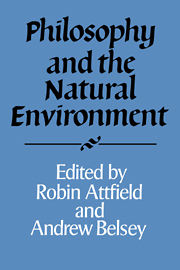Book contents
- Frontmatter
- Contents
- Preface
- Notes on Contributors
- Introduction
- Value in Nature and the Nature of Value
- Ecology and the Ethics of Environmental Restoration
- Rehabilitating Nature and Making Nature Habitable
- Personalistic Organicism: Paradox or Paradigm?
- Values, Reasons and the Environment
- Awe and Humility: Intrinsic Value in Nature. Beyond an Earthbound Environmental Ethics
- The End of Anthropocentrism?
- Global Religion
- Kant and the Moral Considerability of Non-Rational Beings
- The Idea of the Environment
- Chaos and Order, Environment and Anarchy
- Natural Capital
- Some Philosophical Assessments of Environmental Disobedience
- Global Environmental Justice
- Environmental and Medical Bioethics in Late Modernity: Anthony Giddens, Genetic Engineering and the Post-Modern State
- Highlights and Connections
- Bibliography
- Index
Awe and Humility: Intrinsic Value in Nature. Beyond an Earthbound Environmental Ethics
Published online by Cambridge University Press: 19 October 2009
- Frontmatter
- Contents
- Preface
- Notes on Contributors
- Introduction
- Value in Nature and the Nature of Value
- Ecology and the Ethics of Environmental Restoration
- Rehabilitating Nature and Making Nature Habitable
- Personalistic Organicism: Paradox or Paradigm?
- Values, Reasons and the Environment
- Awe and Humility: Intrinsic Value in Nature. Beyond an Earthbound Environmental Ethics
- The End of Anthropocentrism?
- Global Religion
- Kant and the Moral Considerability of Non-Rational Beings
- The Idea of the Environment
- Chaos and Order, Environment and Anarchy
- Natural Capital
- Some Philosophical Assessments of Environmental Disobedience
- Global Environmental Justice
- Environmental and Medical Bioethics in Late Modernity: Anthony Giddens, Genetic Engineering and the Post-Modern State
- Highlights and Connections
- Bibliography
- Index
Summary
This paper will argue for a conception of intrinsic value which, it is hoped, will do justice to the following issues:
(1) that Nature need not and should not be understood to refer only to what exists on this planet, Earth;
(2) that an environmental ethics informed by features unique to Earth may be misleading and prove inadequate as technology increasingly threatens to invade and colonize other planets in the solar system;
(3) that a comprehensive environmental ethics must encompass not only our attitude to Earth, but to other planets as well—in other words, it must not simply be an Earthbound but virtually an astronomically bounded ethics.
What is unique about Earth? That it has water and an atmosphere which supports life. Its atmosphere preserves a constant 0·03% of carbon dioxide, 1·7 ppm of methane, 21% of oxygen, 79% of nitrogen, a surface temperature of 13°C. Water covers roughly two thirds of its surface. By contrast, planets like Venus and Mars which have no life and no water (at least today) have no methane either, but respectively 96·5% and 95% of carbon dioxide, 3·5% and 2·7% of nitrogen, a mere trace and 0·13% of oxygen, and surface temperatures of 459°C and -53°C (see Lovelock, 1988, p. 9).
- Type
- Chapter
- Information
- Philosophy and the Natural Environment , pp. 89 - 102Publisher: Cambridge University PressPrint publication year: 1994
- 12
- Cited by

